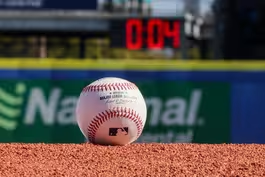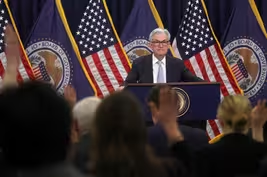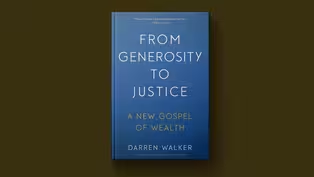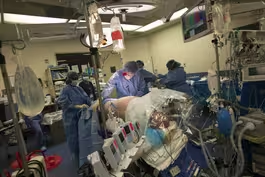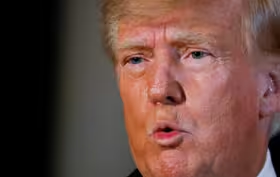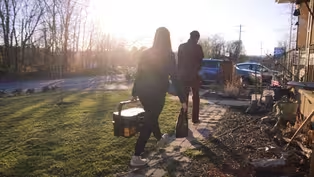
Supreme Court hears case involving Jack Daniel's and dog toy
Clip: 3/22/2023 | 4m 38sVideo has Closed Captions
Supreme Court hears trademark case involving Jack Daniel's and dog toys
The maker of Jack Daniel's whiskey has a bone to pick with the marketer of dog chew toys. The distiller of the iconic American liquor wants to muzzle VIP Products over a squeaky dog toy called Bad Spaniels. The case made it to the Supreme Court on Wednesday. As John Yang reports, it raises questions about free speech and commercial trademark protections.
Problems playing video? | Closed Captioning Feedback
Problems playing video? | Closed Captioning Feedback
Major corporate funding for the PBS News Hour is provided by BDO, BNSF, Consumer Cellular, American Cruise Lines, and Raymond James. Funding for the PBS NewsHour Weekend is provided by...

Supreme Court hears case involving Jack Daniel's and dog toy
Clip: 3/22/2023 | 4m 38sVideo has Closed Captions
The maker of Jack Daniel's whiskey has a bone to pick with the marketer of dog chew toys. The distiller of the iconic American liquor wants to muzzle VIP Products over a squeaky dog toy called Bad Spaniels. The case made it to the Supreme Court on Wednesday. As John Yang reports, it raises questions about free speech and commercial trademark protections.
Problems playing video? | Closed Captioning Feedback
How to Watch PBS News Hour
PBS News Hour is available to stream on pbs.org and the free PBS App, available on iPhone, Apple TV, Android TV, Android smartphones, Amazon Fire TV, Amazon Fire Tablet, Roku, Samsung Smart TV, and Vizio.
Providing Support for PBS.org
Learn Moreabout PBS online sponsorshipAMNA NAWAZ: Supreme Court arguments often deal with weighty matters, like abortion, religion and discrimination.
Today, as John Yang reports, they focused on a chew toy for dogs in a case that raises questions about free speech and commercial trademark protections.
JOHN YANG: The maker of Jack Daniel's whiskey has a bone to pick with a marketer of dog chew toys.
The distiller of the iconic American liquor wants to muzzle VIP Products, America's second largest dog toy company and part of the $100 billion-a-year pet products market.
For more than 120 years, Jack Daniel's has used a distinctive square bottle adorned with Old No.
7 and Tennessee Sour Mash Whiskey.
Beginning in 2014, VIP began selling a squeaky dog toy called Bad Spaniels, a replica of a Jack Daniel's bottle that proclaims "The Old No.
2 on Your Tennessee Carpet."
NARRATOR: The hilarious dog toy that will have everyone talking.
JOHN YANG: It's part of their Silly Squeakers lines.
VIP says it's a playful parody.
Jack Daniel's says it could confuse consumers into thinking it's their product.
So now this dog toy tug-of-war has come to the Supreme Court.
The question the justices are being asked to decide is, when does parody crossed the line from protected free speech to commercial trademark infringement?
Free speech advocates lined up behind the dog toy company, filing amicus briefs defending parody as a recognized form of social commentary.
Companies such as Nike, Patagonia and Campbell's Soup support Jack Daniel's, saying notable trademarks need protection.
JOHN ROBERTS, Chief Justice of the U.S. Supreme Court: We will hear argument this morning in case 22-148.
JOHN YANG: The justices worked through the competing interests during today's oral argument, which included references to a pornographic movie depicting the Dallas Cowboy cheerleader uniforms.
The attorney for Jack Daniel's, Lisa Blatt: LISA BLATT, Attorney for Jack Daniel's: The movie "Debbie Does Dallas" was not aesthetically pleasing.
It infringed a trademark.
So the other side wants to talk about the uses they like.
They don't want to talk about the pornographic and poisonous things that can be done when you infringe someone's trademark.
JOHN ROBERTS: Thank you, counsel.
JOHN YANG: Justice Samuel Alito worried about the case's First Amendment implications and seemed skeptical that Bad Spaniels could be confused as a product from Jack Daniel's.
SAMUEL ALITO, U.S. Supreme Court Associate Justice: Could any reasonable person think that Jack Daniel's had approved this use of the mark?
Let me envision this scene.
Somebody in Jack Daniel's comes to the CEO and says, I have a great idea for a product that we're going to produce.
It's going to be a dog toy.
And it's going to have a label that looks a lot like our label.
And it's going to have a name that looks a lot like our name, Bad Spaniels.
And what's going to be in -- purportedly in this dog toy is dog urine.
You think the CEO is going to say, that's a great idea, we're going to produce that thing?
JOHN YANG: Justice Elena Kagan questioned how a dog toy could be protected speech expressing a message?
ELENA KAGAN, U.S. Supreme Court Associate Justice: This is not a political T-shirt.
It's not a film.
It's not an artistic photograph.
It's nothing of those things.
It's a standard commercial product.
I don't see the parody, but, you know, whatever.
BENNETT COOPER, Attorney for VIP Products: The distinction between utilitarian goods and expressive works is a nonexistent standard.
ELENA KAGAN: Dog toys are just utilitarian goods.
And you're using somebody else's mark as a source identifier.
And that's not a First Amendment problem.
JOHN YANG: "NewsHour" Supreme Court analyst Marcia Coyle: MARCIA COYLE: This court is very strong on First Amendment speech.
There are justices who are concerned about not killing parody, which is a very useful and fun part of our lives and products.
So, I do think that they're trying to balance the First Amendment concerns here with the actual parody and whether it does damage to Jack Daniel's trademark.
JOHN YANG: The justices will chew over the arguments as they consider their decision, which should come by the end of June.
For the "PBS NewsHour," I'm John Yang.
Baseball's new pitch clock speeds up the game
Video has Closed Captions
Clip: 3/22/2023 | 5m 19s | Baseball's new pitch clock speeds up the game, draws mixed reaction from players and fans (5m 19s)
Fed raises interest rates again in wake of bank failures
Video has Closed Captions
Clip: 3/22/2023 | 8m 3s | Fed raises interest rates again in wake of bank failures (8m 3s)
'From Generosity to Justice' proposes shift in giving
Video has Closed Captions
Clip: 3/22/2023 | 7m 41s | Darren Walker proposes shift in focus of giving in new book 'From Generosity to Justice' (7m 41s)
Government announces organ transplant system overhaul plan
Video has Closed Captions
Clip: 3/22/2023 | 6m 15s | Biden administration proposes overhaul of organ transplant system (6m 15s)
Political ramifications of Trump's legal troubles
Video has Closed Captions
Clip: 3/22/2023 | 7m 10s | How Trump's possible indictments will influence Republican political strategy (7m 10s)
West Virginia doctors work to bridge rural healthcare gap
Video has Closed Captions
Clip: 3/22/2023 | 9m 3s | West Virginia doctors work to bridge healthcare gap in rural areas (9m 3s)
Providing Support for PBS.org
Learn Moreabout PBS online sponsorshipSupport for PBS provided by:
Major corporate funding for the PBS News Hour is provided by BDO, BNSF, Consumer Cellular, American Cruise Lines, and Raymond James. Funding for the PBS NewsHour Weekend is provided by...
